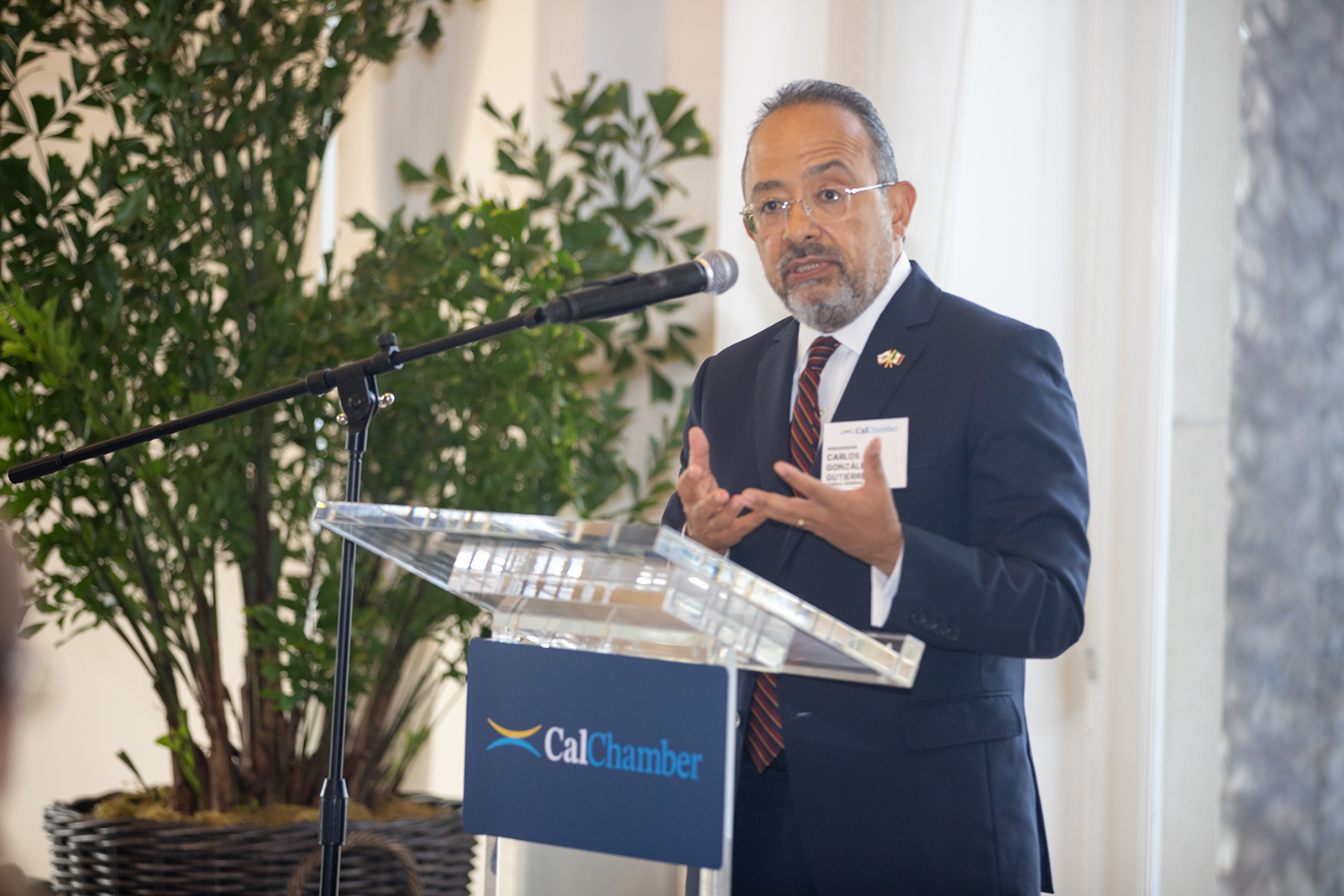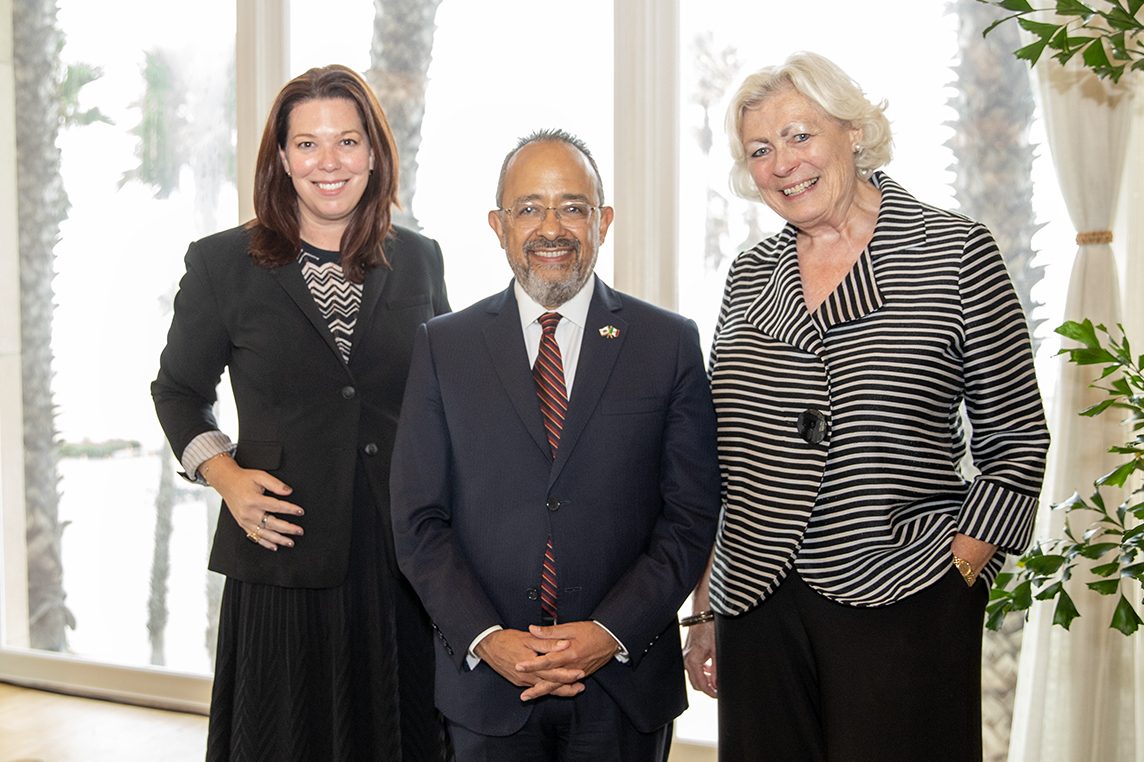
The changed paradigm of U.S.-Mexico relations and the implications for both trading partners was the focus of the recent breakfast meeting of the CalChamber Council for International Trade.
The featured speaker at the Sept. 19 gathering in Santa Monica was Ambassador Carlos González Gutiérrez, consul general of Mexico in Los Angeles.
The North American Free Trade Agreement (NAFTA), signed in 1994, has been extremely successful from Mexico’s perspective, the Consul General said. Under NAFTA and its successor, the U.S.-Mexico-Canada Agreement (USMCA), negotiated during the first Trump administration, Mexico has remained the United States’ No. 1 trading partner.
Last year, U.S.-Mexico trade topped $800 billion, nearly 10 times greater than it was when NAFTA was signed, González Gutiérrez reminded his audience.
Thirty years ago, he noted, there was bipartisan agreement that long-term, free trade and immigration were good for the United States. Unfortunately, that is no longer the case and “everything is on the table,” he said.

Integrated Economies
He identified two problems resulting from the new approach: consumers in the United States are the ones paying the increased tariffs; and if a country wants to avoid tariffs, it must reshore operations in the U.S.
As for the second idea, no country in the world can make a product by itself because every sophisticated product that enriches our lives today and that we are used to now, is the result of a “complex manufacturing and trading network,” the Consul General said. People, parts and knowledge move back and forth across borders.
U.S.-Mexico relations are so integrated after 30 years of NAFTA and the USMCA that “we build things together, we share a common production platform on which both countries depend,” he observed.
Tariff Challenges
Uncertainties about tariffs have been a challenge, the Consul General said, noting that about every 90 days starting on February 4, the date by which Mexico was supposed to “get a deal or else” has shifted. Goods that comply with USMCA terms are subject to 0% tariffs, he said, while the bottom rate for countries that don’t have an agreement by the end of October will go from 2.5% to 25%.
The 50% tariff on aluminum and steel products includes Mexico.
The various tariffs based on the source of a product component means customs brokers must work three times more, he said because every unnamed component of a product has to be separated, and the tariff figured out for that component.
Mexican tomatoes, subject to no tariffs under the USMCA, are at 17.9%. Mexico now faces a “new reality,” he said, in which “USMCA products are not as free of tariffs as we would like to be.”
Negotiations will start “very soon,” and domestic consultations have begun, the Consul General said. Mexico President Claudia Sheinbaum recently invited Canadian Prime Minister Mark Carney to come to Mexico to see if they had common ground to use in discussions with the United States.
The Consul General described Mexico as one of the most open countries in the world and a nation that has the greatest number of free trade agreements. Mexico is considering raising its tariffs on products from countries with which it doesn’t have a trade agreement. Examples include tariffs of up to 50% on Chinese electric vehicles, 35%–50% on textiles; 35% on aluminum and 50% on auto parts.

Security/Immigration
During the last year of the Biden administration, undocumented immigration from Mexico through the southern border of the U.S. fell 80%, the Consul General said, because “we realized that domestic politics [in the U.S.] were changing.”
When President Trump assumed office, Mexico adopted a different approach to security issues “not because the U.S. asked us to do it, but because we were losing our country,” said Consul General González Gutiérrez.
Under President Sheinbaum, who assumed office October 1, 2024, the policy has been to place collaboration with the United States at the forefront, the Consul General said.
During Sheinbaum’s first 100 days in office, for example, 7,720 suspects with ties to organized crime were arrested. In contrast, under her predecessor, President Andrés Manuel López Obrador, only 31 suspects were arrested..
The U.S. administration’s decision to conduct immigration operations at levels not seen before has had a huge impact in Los Angeles and other cities, the Consul General said. About 5,000 people have been arrested in Southern California since June 6.
The Mexican consulate sends teams directly to detention centers to interview the arrested Mexican nationals, get information about the circumstances of the arrest and provide legal representation to those who want to have their day in court, the Consul General said.
So far, consulate teams have interviewed 844 Mexican nationals. Of those persons, 51% have lived in the United States for more than 10 years and 37% have children born in the U.S. Nearly 39% have been deported to Mexico and just 3% have been able to secure bail or been released.
The greatest impact, he said, will be the lack of labor in the business sectors that have been most affected by the arrests because of the fear and the panic that the immigration operations have created in the social fabric of Los Angeles: construction (15%), car washes (14%), gardeners/landscaping (8%), field workers (7.3%), day laborers (7%), blue collar workers (6%).
“Fear is not an unintended consequence [of the immigration actions]. Creating fear is the essence of this conduct,” he concluded.

